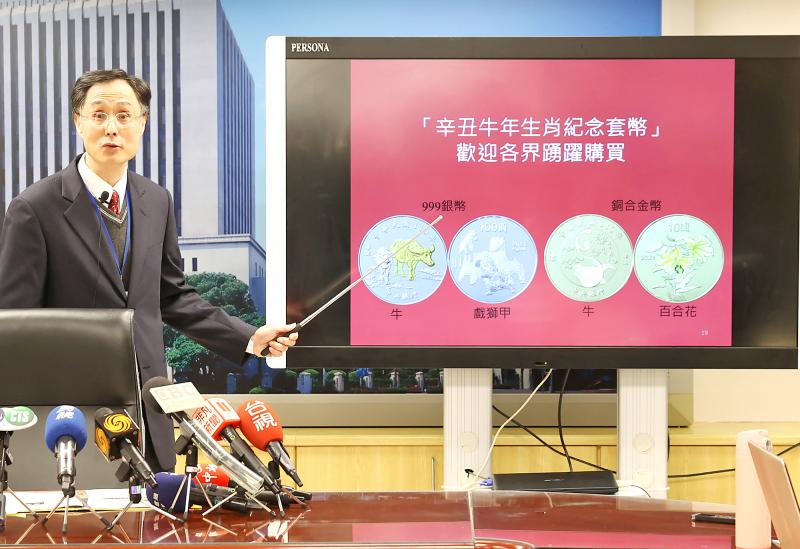The central bank yesterday unveiled a set of Chinese zodiac commemorative coins for the Year of the Ox, which are available to order online through Wednesday next week or at Bank of Taiwan (臺灣銀行) branches nationwide from Jan. 21.
The central bank plans to sell 100,000 sets of the coins, with each set consisting of one silver coin weighing 1 ounce (28.3g) with a face value of NT$100 and one copper-alloy coin with a face value of NT$10.
A set costs NT$1,800, it said.

Photo: CNA
The silver coin’s obverse side has a gold-plated image of an ox and the reverse bears an image of the lion dance festival in Kaohsiung’s Cianjhen District (前鎮), the central bank said.
The lion dance carries not only unique local characteristics, but also has the symbolic meaning of disaster and epidemic prevention in a world that has been largely turned upside down by the COVID-19 pandemic, Issuance Department Director-General Shih Tsuen-hua (施遵驊) told a news conference in Taipei.
The copper-alloy coin bears an image of an ox on its obverse side, while the reverse side has a lily pad, the central bank said.
The central bank started issuing Chinese zodiac commemorative coin sets in 2017 for the Year of the Rooster.
The bank last year sold 110,000 sets for the Year of the Rat.
The reduction of 10,000 sets for this year’s sale target reflects the central bank’s estimation of demand, Shih said.

Taiwan Semiconductor Manufacturing Co (TSMC, 台積電) yesterday said that its investment plan in Arizona is going according to schedule, following a local media report claiming that the company is planning to break ground on its third wafer fab in the US in June. In a statement, TSMC said it does not comment on market speculation, but that its investments in Arizona are proceeding well. TSMC is investing more than US$65 billion in Arizona to build three advanced wafer fabs. The first one has started production using the 4-nanometer (nm) process, while the second one would start mass production using the

‘SILVER LINING’: Although the news caused TSMC to fall on the local market, an analyst said that as tariffs are not set to go into effect until April, there is still time for negotiations US President Donald Trump on Tuesday said that he would likely impose tariffs on semiconductor, automobile and pharmaceutical imports of about 25 percent, with an announcement coming as soon as April 2 in a move that would represent a dramatic widening of the US leader’s trade war. “I probably will tell you that on April 2, but it’ll be in the neighborhood of 25 percent,” Trump told reporters at his Mar-a-Lago club when asked about his plan for auto tariffs. Asked about similar levies on pharmaceutical drugs and semiconductors, the president said that “it’ll be 25 percent and higher, and it’ll

CHIP BOOM: Revenue for the semiconductor industry is set to reach US$1 trillion by 2032, opening up opportunities for the chip pacakging and testing company, it said ASE Technology Holding Co (日月光投控), the world’s largest provider of outsourced semiconductor assembly and test (OSAT) services, yesterday launched a new advanced manufacturing facility in Penang, Malaysia, aiming to meet growing demand for emerging technologies such as generative artificial intelligence (AI) applications. The US$300 million facility is a critical step in expanding ASE’s global footprint, offering an alternative for customers from the US, Europe, Japan, South Korea and China to assemble and test chips outside of Taiwan amid efforts to diversify supply chains. The plant, the company’s fifth in Malaysia, is part of a strategic expansion plan that would more than triple

Taiwanese artificial intelligence (AI) server makers are expected to make major investments in Texas in May after US President Donald Trump’s first 100 days in office and amid his rising tariff threats, Taiwan Electrical and Electronic Manufacturers’ Association (TEEMA, 台灣電子電機公會) chairman Richard Lee (李詩欽) said yesterday. The association led a delegation of seven AI server manufacturers to Washington, as well as the US states of California, Texas and New Mexico, to discuss land and tax issues, as Taiwanese firms speed up their production plans in the US with many of them seeing Texas as their top option for investment, Lee said. The